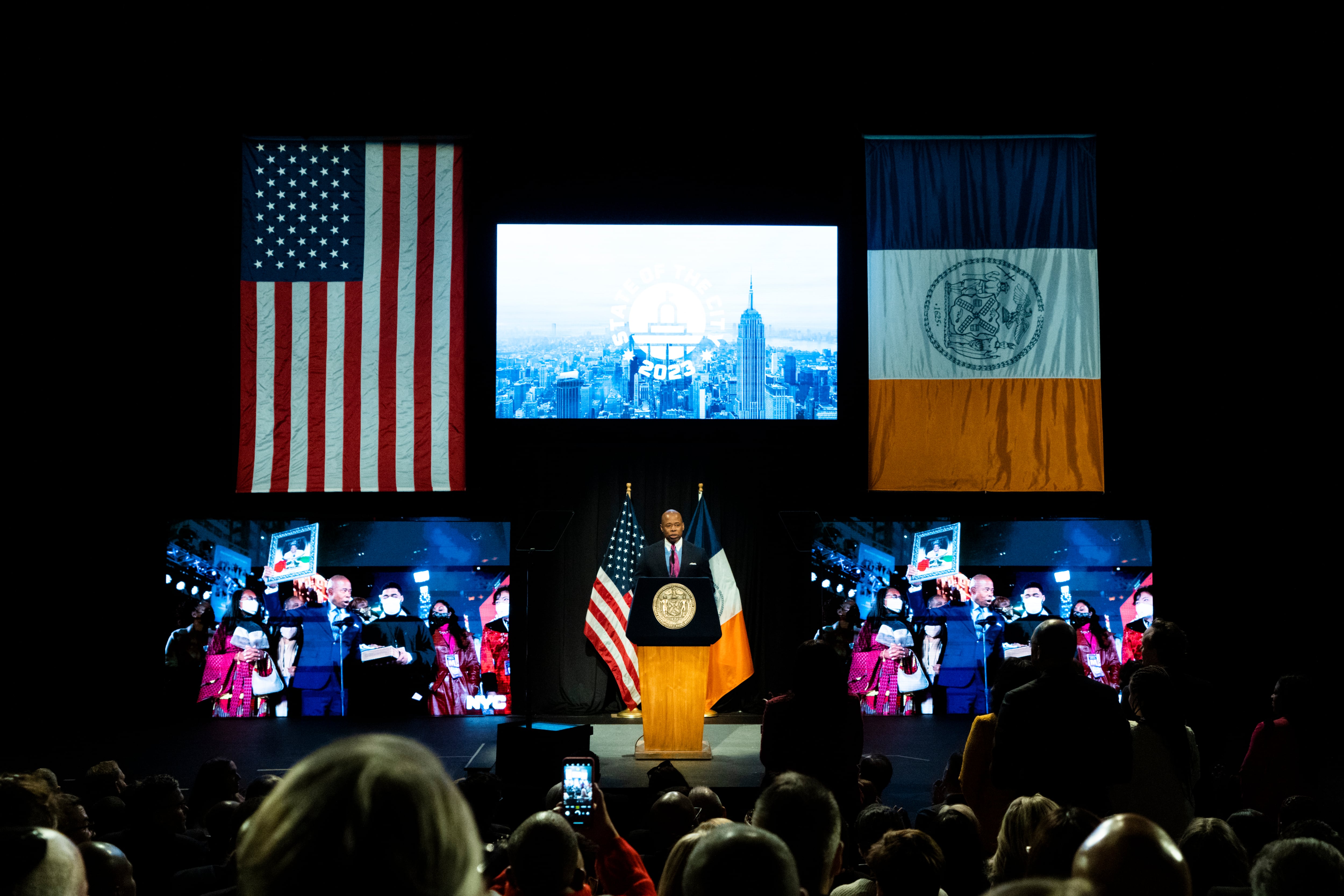All New York City high school students will have access to mental health support through telehealth programs, Mayor Eric Adams announced Thursday, his first major effort to address growing concerns about student wellbeing.
“This year we’re rolling out the biggest student mental health program in the country,” Adams said during his annual State of the City speech at the Queens Theatre. “We will provide our high school students with everything from telehealth care to community-based counseling depending on their individual needs.”
Many students experienced trauma during the pandemic, including the loss of loved ones and frayed social bonds during long periods of isolation. Mental health professionals have seen increases in anxiety, suicidal thoughts, and behavior challenges, trends that have raised alarms.
School districts across the country are increasingly leaning on telehealth, which may help ease some barriers to mental health care and could make students or families more likely to attend sessions. Still, telehealth requires access to devices, internet, and private space, which may be difficult to guarantee depending on whether students will be expected to access services from home.
City officials did not immediately provide details about how the program will work, but some experts said they were cautiously optimistic about the announcement.
“I appreciate that the city is responding to really apparent needs of children and teenagers,” said Kevin Dahill-Fuchel, the executive director of Counseling in Schools, an organization that partners with about 70 schools across the city to provide mental health services. The schools his organization works with typically have more students in need of mental health support than Counseling in Schools can provide in a given year.
Dahill-Fuchel said there are a number of details that need to be filled in to properly understand how the telehealth program will work. Will the telehealth sessions operate as virtual drop-in centers where students can share their feelings or more traditional counseling sessions? What is the mechanism for students to access those programs, and will students participate from school? Will school staff be involved in monitoring it and potentially get involved if students have more serious needs?
“It raises lots of procedural questions which maybe they will fill in later, but it’s hard for me not to focus on those right away,” Dahill-Fuchel said.
The city is still exploring how to deliver telehealth services, a spokesperson for the city’s health department wrote in an email, offering no further comment about how the program will work.
The mayor’s mental health push included a few other components as well, including “daily breathing and mindfulness exercises.”
Jelena Obradović, a researcher at Stanford University who has studied breathing exercises, said those techniques can help students regulate their physiology, but little research has been conducted on whether those exercises improve learning outcomes.
“Teachers and students need effective strategies for responding to stressful lived experiences,” Obradović wrote in an email. “Deep breathing exercises could be incorporated in schools alongside a full [social emotional learning] curriculum, but shouldn’t be used as a replacement for it.”
City officials have not responded to questions about whether the breathing exercises will be tied to a formal curriculum.
Here are other education initiatives Adams highlighted during his speech:
- Adams touted some of his early literacy efforts, including a move to require elementary schools use a phonics program. He also vowed to expand screening for dyslexia to all campuses and open a school specifically dedicated for dyslexic students. That commitment has previously garnered mixed reactions from experts who argue all schools should be able to educate students with reading challenges.
- Up to 35,000 middle school students in the city’s summer school program will get “career exposure” and access to college visits. (Under the previous administration, the city’s College Access for All program aimed to give all middle school students access to college visits.)
- Adams said about 90 schools and 7,000 students will participate in a program called FutureReadyNYC, which is designed to expose students to possible career interests in high school, earn college credit, or receive industry credentials. Previously, 30 high schools and 5,000 students were expected to participate.
- The mayor said he plans to “expand nutrition education standards and plant-powered menus in our schools.” The city has already begun transitioning to vegan lunches in school cafeterias on Fridays, though some students have been reluctant to eat them. “Our children may hate me today but they will love me tomorrow,” Adams said.
Alex Zimmerman is a reporter for Chalkbeat New York, covering NYC public schools. Contact Alex at azimmerman@chalkbeat.org.





